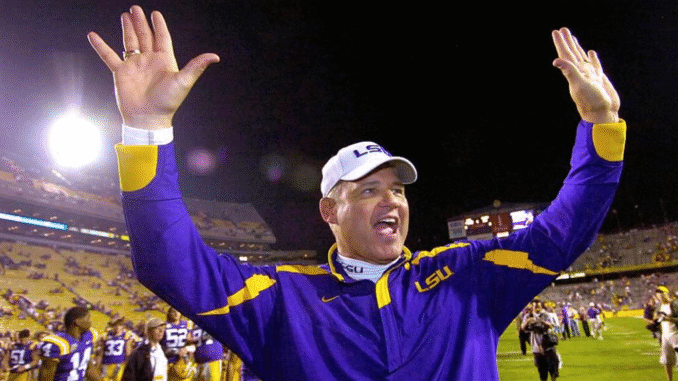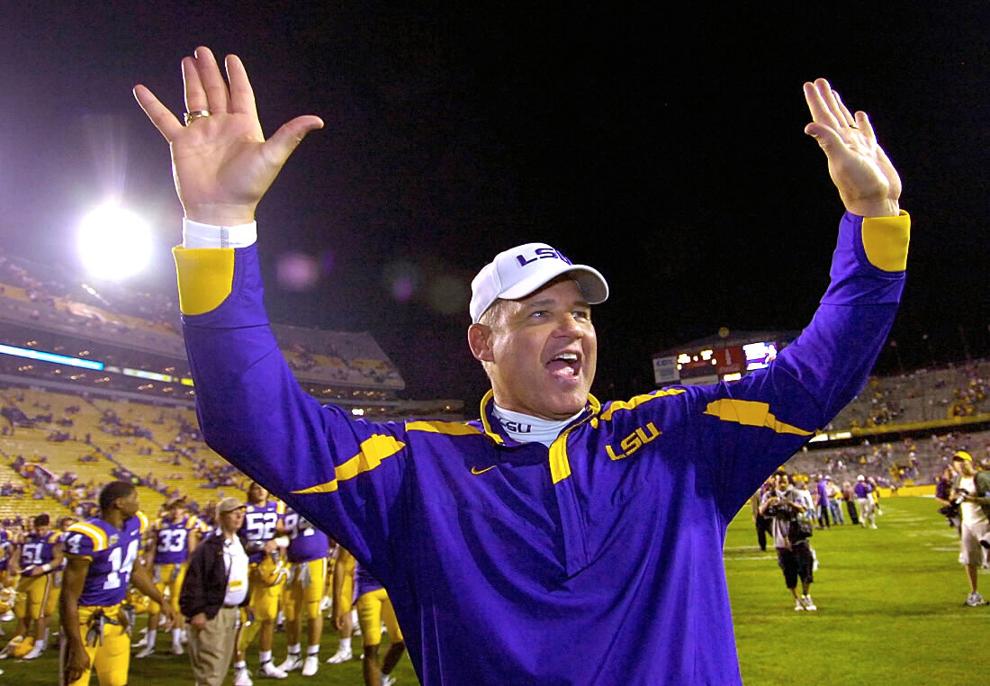
Upstairs at the College Football Hall of Fame in Atlanta—where SEC Media Days took place earlier this month—there’s a large, circular room, its walls lined with the names of every legendary college football player and coach ever inducted.
Thanks to a recent tweak in the selection criteria for coaches, that room may now be within reach for former LSU head coach Les Miles. Whether he’ll actually make it through those literal and symbolic doors is still uncertain. Think of it as first-and-10 from his own 20-yard line—he’s got a long drive ahead, but at least he’s back in the game. Not long ago, it looked like he might never take the field again.
For years, the criteria to be considered for Hall of Fame induction as a coach were strict: at least 100 games coached over a 10-year career, retirement for a minimum of three years, an age of 70 or older (or 75 and still active), and—perhaps most significantly—a career winning percentage of .600 or better.
But in May, the National Football Foundation, which oversees the selection process, relaxed that final requirement, lowering the threshold slightly to a .595 winning percentage. At SEC Media Days, NFF president and CEO Steve Hatchell explained that .595 still rounds up to 60%, statistically speaking. In football, it seems, rounding up is fair play.

It’s widely understood in the college football world that the National Football Foundation made its recent change to Hall of Fame eligibility—the adjustment to a .595 minimum winning percentage—in response to the groundswell of support for the late Mike Leach. Beloved for his brash, quirky personality and revered as the architect of the Air Raid offense, Leach was a trailblazer. But his career winning percentage stood at just .596, narrowly missing the previous .600 cutoff.
“I believe that was done for my friend, Mike,” said West Virginia head coach Rich Rodriguez, a former Tulane assistant who, incidentally, also sits at .596.
While the change may have been driven by Leach’s case, it swept up several others along the way. Rodriguez is among them, as is former Mississippi State, Texas A&M, and Pittsburgh coach Jackie Sherrill (.595). And so is Les Miles, whose official record now stands at .597.
To appear on the Hall of Fame ballot, though, coaches must meet one final criterion: they must be nominated by a school where they coached. For Miles, 71, that would mean LSU, Oklahoma State, or Kansas. (Michigan, where he played, can’t nominate him—he was never a first-team All-American.)
Here’s where things get complicated for “The Hat.”
Kansas is unlikely to step up. Miles went just 2-18 during a tumultuous stint there. Oklahoma State, where he was 28-21 over four seasons before leaving for LSU in 2005, also seems an unlikely advocate.
That leaves LSU, where the bulk of Miles’ coaching legacy was made. Over 12 seasons, he compiled a 114-34 record, won a BCS national championship, played for another, and claimed two SEC titles while competing for a third. On the field, he finished his 18-year career with a .665 winning percentage (145-73).
But those numbers don’t tell the whole story.
LSU later vacated 37 of Miles’ wins due to NCAA violations involving improper benefits tied to the Our Lady of the Lake Foundation scandal. Officially, those vacated victories adjusted Miles’ career record to 108-73—a .59668 winning percentage, just barely above the new threshold.
That’s only part of the baggage. Miles sued LSU in an attempt to restore those vacated wins, but a judge dismissed the case in March. More significantly, he was implicated in a 2021 sexual harassment scandal stemming from his time at LSU. A secret settlement with a former female student came to light in the Husch Blackwell investigation, which ultimately led to his dismissal from Kansas. A lawsuit filed against both LSU and Miles alleges that he “groomed, sexually and emotionally manipulated, and damaged” the student, whom he had recruited from a sorority to work for him.
Given all that, it’s far from certain that LSU would be willing to nominate him for Hall of Fame consideration. Then again, there’s been no official indication that the school has ruled it out either. The revised .595 rule won’t take effect until the 2027 nomination cycle, giving LSU time to make a decision.
Les Miles presents a difficult case—for LSU, for the NFF, and for voters. But based solely on on-field accomplishments, his resume is hard to ignore. While Leach never won a conference title, much less a national one, Miles won it all, and then some. Plenty of coaches with thinner resumes already have their names on the Hall’s hallowed walls.
Despite the controversy, Les Miles has done enough to at least warrant consideration. Whether he gets it is a question only time—and LSU—can answer.

Leave a Reply